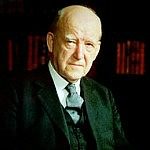Quotes about Revelation-Complete
Some persons think they can know God by means of their own human reason. But reason is a blind ally spiritually. It has always been the great minds exercising their powers apart from the Word of God who have produced the great heresies. Some think they can discover God by listening to a so-called “inner voice.” But the voice is often nothing more than an expression of their own inner desires. Quite a few think that spiritual truths can be verified by supernatural events or miracles. But the Bible everywhere teaches that even miracles will not lead men and women to understand and receive God’s truth unless they themselves are illuminated by the Bible (see Luke 16:31). I believe that we can state categorically that there is no knowledge apart from Jesus Christ and that there is no knowledge of Jesus Christ apart from a knowledge of the Bible.
Why is God silent? Why does the God of all the universe not speak?… God has already spoken everything that can probably be spoken graciously. Jesus is the ultimate, final word of God in that area. Not a syllable can be added. The only words that remain to be spoken are the final words of judgment.
The fanaticism which discards the Scripture, under the pretense of resorting to immediate revelations is subversive of every principle of Christianity. For when they boast extravagantly of the Spirit, the tendency is always to bury the Word of God so they may make room for their own falsehoods.
Revelation is no usual book. It is a sweeping analysis of history from the first advent of Christ to the second. Jesus had promised that the Spirit would teach His apostles “all things” (John 14:26). The Spirit had come and fulfilled the promise. Apostles had communicated the authoritative word. The task of revelation was finished. The Book of Revelation is the last apostolic word to the church. The Almighty Saviour, seated at God’s right hand, opens His sovereign lips personally to declare that nothing is to be added to what has been recorded. Beware of meddling with Christ’s revelation.
Failure to see Jesus Christ as the final revelation of truth is a major error that will open the door of the church to a multitude of heresies, taught in the name of truth. Every true movement initiated by the Spirit of God leads men back to the words of Christ which were inscripturated by His own inspiration.
All who claim a supernatural inspiration must stand prepared to prove it by supernatural works.
God’s speech to us by His Son is the culmination of His speaking to mankind and is His greatest and final revelation to mankind in this period of redemptive history. The exceptional greatness of the revelation that comes through the Son, far exceeding any revelation in the old covenant, is emphasized again and again throughout chapters 1 and 2 of Hebrews. These facts all indicate that there is a finality to the revelation of God in Christ and that once this revelation has been completed, no more is to be expected.
Biblicaltraining.org, www.biblicaltraining.org/library/canon-scripture-wayne-grudem#sthash.akyA4tL7.dpuf. Used by Permission.
We must never separate the Spirit and the Word. The Spirit speaks to us through the Word; so we should always doubt and query any supposed revelation that is not entirely consistent with the Word of God. Indeed the essence of wisdom is to reject altogether the term “revelation” as far as we are concerned, and speak only of “illumination.” The revelation has been given once and for all, and what we need and what by the grace of God we can have, and do have, is illumination by the Spirit to understand the Word.
Once a congregation sees Scripture as less than the final, complete, infallible authority for faith and practice, it has opened the doors to theological chaos. Anyone can claim to be speaking God’s revelation – and almost anything can be passed off as divinely revealed truth.
Charismatic Chaos, Zondervan, © John MacArthur, 1992, p. 66, www.zondervan.com. Get this book!
From the time of the apostles until the present, the true church has always believed that the Bible is complete. God has given His revelation and now Scripture is finished. God has spoken. What He gave is complete, efficacious, sufficient, inerrant, infallible, and authoritative. Attempts to add to the Bible, and claims of further revelation from God have always been characteristic of heretics and cultists, not the true people of God.
The New Testament prophetic gift (Rom. 12:6; 1 Cor. 12:10) primarily has to do with declaration, not revelation. The New Testament prophet “speaks to men for edification and exhortation and comfort” (1 Cor. 14:3). He is a preacher, not a source of ongoing revelation. His task is one of forth-telling, not foretelling. That is, he proclaims already revealed truth; he is not generally a conduit for new revelation… This revelatory aspect of prophecy was unique to the apostolic era.
God’s Word is not up for review, debate, or editing. In the words of the psalmist, “Forever, O Lord, Your word is settled in heaven” (Psalm 119:89). Scripture doesn’t pass away, go out of date, or drift out of relevance. No one has the right to redact it, question its pertinence, or set it aside in favor of something more culturally sensitive or socially acceptable. It is flawless and perpetually true and thus the source of all praise and honor given to the Lord.
From the time of the apostles until the present, the true church has always believed that the Bible is complete. God has given His revelation and now Scripture is finished. God has spoken. What He gave is complete, efficacious, sufficient, inerrant, infallible, and authoritative. Attempts to add to the Bible, and claims of further revelation from God have always been characteristic of heretics and cultists, not the true people of God.
[Sola Scriptura is defined as] the comprehensive and completed revelation of the will of God for us by which we can be thoroughly equipped for every good work… Such a complete, perfect, eternal, all-embracing, and all-sufficient revelation from God that it will never need amendment, correction, or supplementation.
Scripture and…revelation itself (Rev. 22:13-14) closes with the book bearing the name of the Lord Jesus Christ. Jesus spoke His last words to the Church as recorded in the Revelation of Jesus Christ. Therefore, those who claim to speak new revelation from God today stand against the preeminence of Christ as the highest revelation of God.
Charismatic Challenge by John Napier, Providence House Publishers, 2003, p. 46-47. Used by permission. All rights reserved.
The Christian faith is unchangeable, which is not to say that men and women of every generation do not need to find it, experience it, and live it; but it does mean that every new doctrine that arises, even though its legitimacy may be plausible asserted, is a false doctrine. All claims to convey some additional revelation to that which has been given by God in this body of truth are false claims and must be rejected (George Lawlor).
Translation and Exposition of the Epistle of Jude, P&R, 1972, p. 45. Used by Permission.
The excessive preeminence given to the Holy Spirit in their devotions and their preoccupation with gifts, ecstasies, and “prophecies” has tended to neglect of the Scriptures. Why be tied to a Book out of the past when one can communicate every day with the living God? But this is exactly the danger point. Apart from the constant control of the written revelation, we soon find ourselves engulfed in subjectivity; and the believer, even if he has the best intentions, can sink rapidly into deviations, illuminism or exaltation. Let each remind himself of the prohibition of taking anything away from Scripture or adding anything to it (Deut. 4:2; Rev. 22:18–19). Almost every heresy and sect has originated in a supposed revelation or a new experience on the part of its founder, something outside the strictly biblical framework.
Paul says the church is “built on the foundation of the apostles and the prophets” (Eph. 2:20). I conclude that all we need to know for salvation and sanctification has been given to us through the teaching of the apostles and prophets, and that this teaching is now found in the Scriptures. Now that God has spoken in the last days through His Son (Heb. 1:2), we don’t need further words from Him to explain what Jesus Christ has accomplished in His ministry, death, and resurrection. Instead, we are “to contend for the faith that was delivered to the saints once for all” through the apostles and prophets (Jude 3).
Why I Am a Cessationist, www.thegospelcoalition.org/article/cessationist Used by Permission from the Gospel Coalition. www.thegospelcoalition.org
In the past God spoke in a variety of forms. Listen to the opening verses from the book of Hebrews. “God, after He spoke long ago to the fathers in the prophets in many portions and in many ways, in these last days has spoken to us in His Son” (Heb. 1:1-2a). In Jesus Christ, the Word of God became incarnate. His words are God’s words. And His words were God’s final and most supreme revelation to mankind. On that holy mountain the Father declared, “This is My beloved Son, with whom I am well-pleased; listen to Him” (Mt. 17:5). Through Christ, Scripture is complete and sufficient for “everything pertaining to life and godliness” (2 Pet. 1:3). God designed it whereby no other revelation would compete with that of His Son. From Genesis to Revelation, the Scriptures are closed, and Christ had the final say.
Claims to special divine revelations are not so much a sign of super-spirituality as they are of evangelical or pietistic megalomania. The days of prophets and apostles, genuine agents of revelation, are past. Such claims today are spurious and exceedingly dangerous.
The Spirit of Revival by Archie Parrish, Introduction, Copyright 2000, Crossway Books, a division of Good News Publishers, Wheaton Illinois 60187, www.crosswaybooks.org. p. 36-37.
Take care never to impute the vain imaginings of your fancy to Him [the Holy Spirit]. I have seen the Spirit of God shamefully dishonored by persons – I hope they were insane – who have said that they have had this and that revealed to them. There has not for some years passed over my head a single week in which I have not been pestered with the revelations of hypocrites or maniacs. Semi-lunatics are very fond of coming with messages from the Lord to me, and it may spare them some trouble if I tell them once for all that I will have none of their stupid messages… Never dream that events are revealed to you by heaven, or you may come to be like those idiots who dare impute their blatant follies to the Holy Ghost. If you feel your tongue itch to talk nonsense, trace it to the devil, not to the Spirit of God. Whatever is to be revealed by the Spirit to any of us is in the Word of God already – He adds nothing to the Bible, and never will. Let persons who have revelations of this, that, and the other, go to bed and wake up in their senses. I only wish they would follow the advice and no longer insult the Holy Ghost by laying their nonsense at His door.
The canon is closed, not because God has stopped speaking, nor because there are no more apostles, but because God sovereignly closed it. God simply ceased inspiring and preserving canonical revelation. Basing the finality of the canon on the cessation of apostleship is disastrous. How can the absence of apostles guarantee the closing of the canon when non-apostles wrote Scripture? Such a view would require us to assert, absurdly, that as long as there are non-apostolic Christians the canon is open!
Are Apostles for Today? November 6, 2006, www.enjoyinggodministries.com. Used by Permission.
This line of prophetic spokesmen from God came to completion in Jesus Christ, God’s incarnate Word, who was Himself a prophet – more than a prophet, but not less – and in the apostles and prophets of the first Christian generation. When God’s final and climatic message, His word to the world concerning Jesus Christ, had been spoken and elucidated by those in the apostolic circle, the sequence of revealed messages ceased. Henceforth the Church was to live and know God by what He had already said, and said for all time.
The Chicago Statement on Biblical Inerrancy, Exposition: Creation, Revelation, and Inspiration.
[What about the books in the Apocrypha?] There are no marks in these books which would attest a divine origin…both Judith and Tobit contain historical, chronological and geographical errors. The books justify falsehood and deception and make salvation to depend upon works of merit… Ecclesiasticus and the Wisdom of Solomon inculcate a morality based upon expediency. Wisdom teaches the creation of the world out of pre-existent matter (Wisd. 11.17). Ecclesiasticus teaches that the giving of alms makes atonement for sin (Ecc. 3.30). In Baruch it is said that God hears the prayers of the dead (Bar. 3.4), and in I Maccabees there are historical and geographical errors.
















